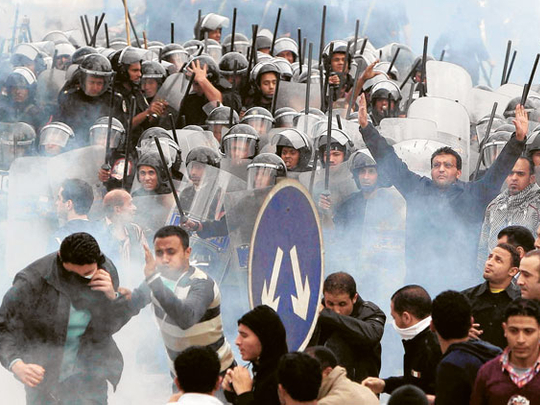
Dubai: The year 2011 has gone down in history as the year of protests, chaos and turbulence around the world. But Amnesty International hopes 2012 will be the "year of action".
Protests swept the globe last year as people demanded freedom, justice and democracy. Sparked first in Tunisia and then in Egypt, demonstrations stretched from Tokyo and Moscow to New York, passing through London, Athens, Dakar and Kampala.
"Globally, we have described it [2011] as the months that have seen an incredible show of strength from ordinary people standing up for their rights, not just in the Middle East and North Africa, but across the world," said Salil Shetty, Secretary-General of Amnesty International, in an interview with Gulf News.
"People stood up at great personal risks. They stood up to demand from their leaders dignity, freedom and accountability. But unfortunately, in the last year, what we didn't see was a commensurate response."
The Amnesty International 2012 annual report was launched yesterday in London, providing a comprehensive overview of the state of human rights in 155 countries and territories around the world.
Worldwide
It spoke of the several problems facing the global population.
Uprisings, discrimination and economic concerns are high on the list of barriers to a better human rights record in the Middle East and North Africa.
Meanwhile, Africa must contend with poverty, political repression, conflict, marginalisation of refugees and migrants, as well as discrimination.
Repressing dissent, inequality for religious and ethnic minorities and armed conflicts are the chief problems for the Asia-Pacific, according to the report.
In Europe and Central Asia, crushing freedom of expression, discrimination, torture and ill-treatment, and impunity in post-conflict situations were highlighted.
As for the Americas, in general, public security is the main problem. Others are related to the rights of women and the death penalty.
In some countries in the region, "governments continued to exploit legitimate concerns regarding public security and high crime rates to justify or to ignore human rights violations committed by their security forces when responding to criminal activities or armed groups", the report noted.
The death penalty and counter-terrorism measures led to the violation of human rights in the United States. "At the end of 2011, nearly two years after US President Barack Obama's missed deadline to close the Guantánamo detention facility, more than 150 men were still held there," the report said.
War on terror
The existence of Guantanamo is proof of western "hypocrisy", Shetty said. Further evidence is the Central Intelligence Agency (CIA) rendition programme, carried out under the banner of the "war on terror" across many European countries, and veiled in secrecy. "The western countries, on one hand, are giving lectures about human rights, and on the other hand are full of hypocrisy and contradiction," Shetty said.
But he said China constituted the biggest challenge globally where human rights are concerned. "On one hand, there is a very good economic progress, and on the other, any form of protests, dissents, opposition are not allowed," Shetty said.
Narrow self-interests
Regimes and governments need to stop following their "individual and narrow self-interests", Shetty said.
"Time has come for national leadership and international leadership to move from empty rhetoric to action. A very concrete opportunity is coming up very soon in July at the UN at the Arms Treaty Conference."
The upcoming conference is the "first opportunity for the international leadership to stand up and show that is responsible", Shetty said.
"For the first time there is a possibility that we can prevent arms from going to the wrong hands, into the countries and governments that can cause human rights violations."
So far, he continued, the response of the United Nations Security Council to last year's protests had been "disappointing". He said he hoped the emerging economies, including South Africa, India and Brazil would act differently, although he noted the trio abstained from voting on a resolution on Syria late last year.












